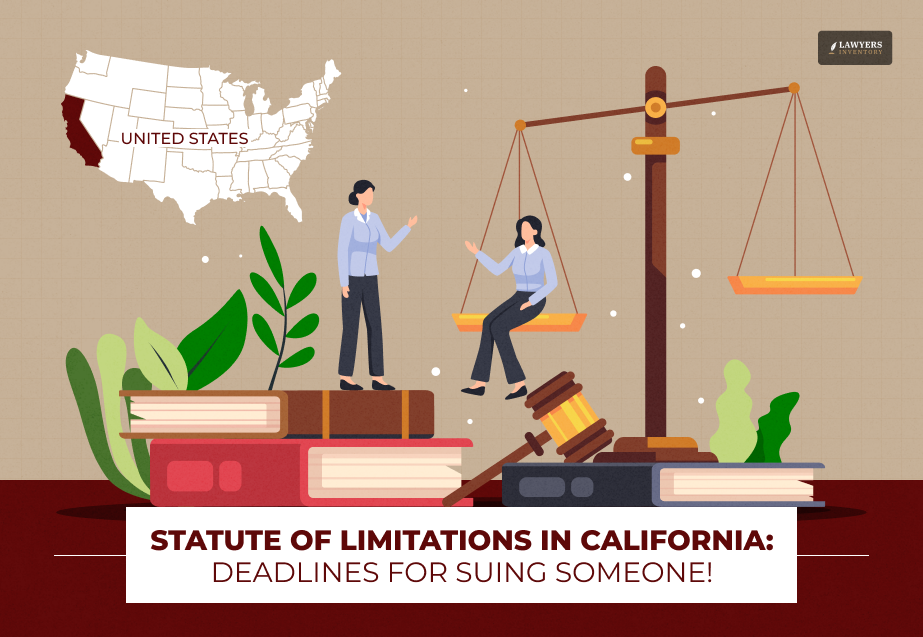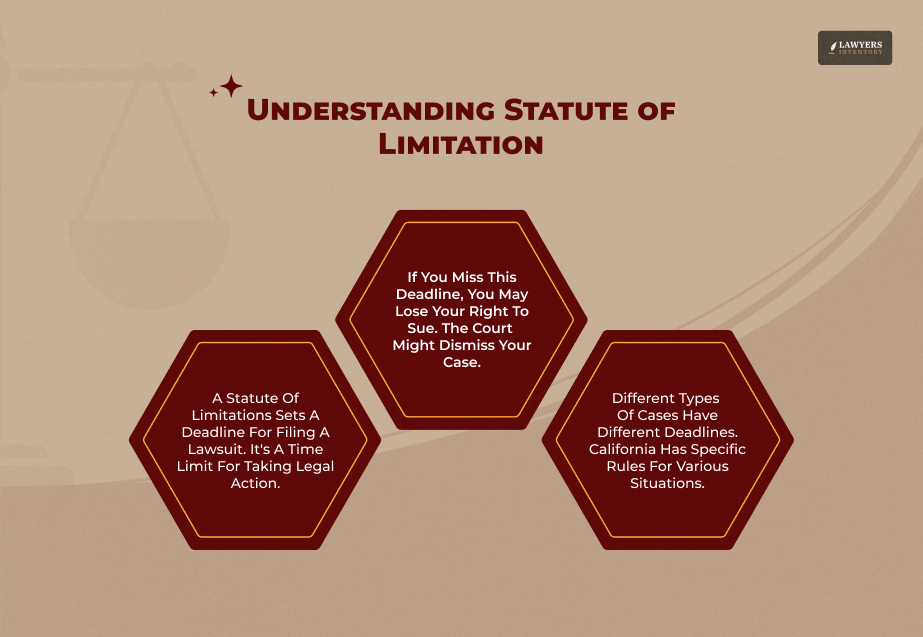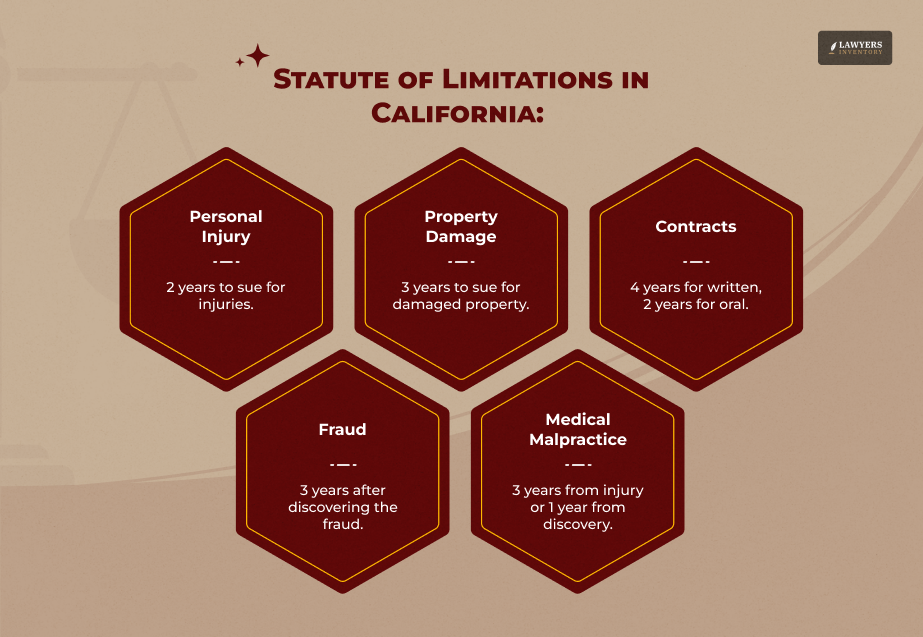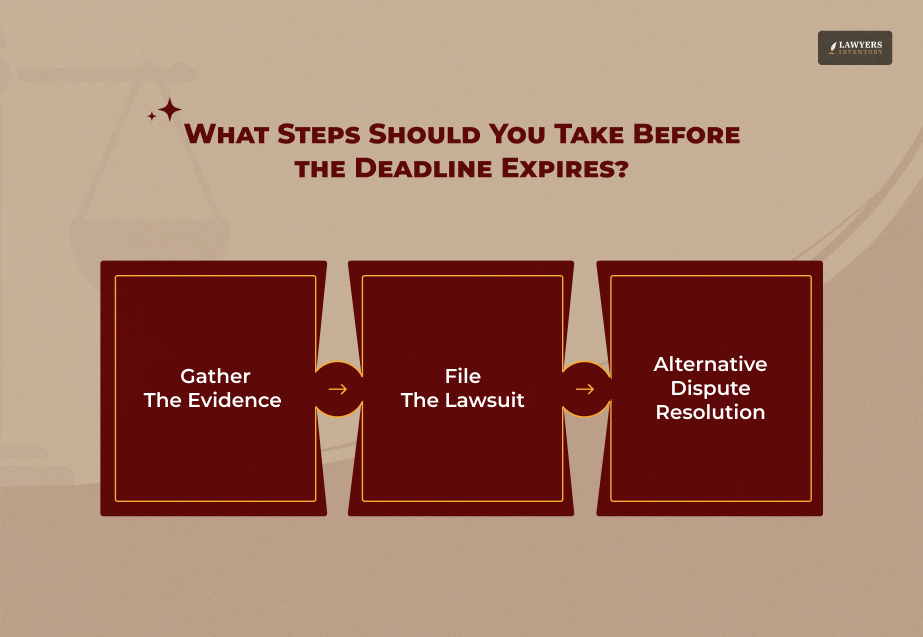
Let’s say that someone takes away your favorite toy. You wait too long, even when you want to ask for it back. When you eventually inquire, someone says, “Sorry, it’s too late!” That is how the statute of limitations in California works.
When someone has a legal issue, the regulation establishes a deadline for when they can appear in court. Different case kinds in California have varying due dates.
For instance, you may have two years to bring a lawsuit if someone injures you. A formal contract may provide you with four years if there are issues. The court might not allow you to sue if you miss the deadline.
Knowing these deadlines is important because waiting too long can take away your chance to get justice.
That’s why understanding California’s statute of limitations can help you protect your rights and take action on time.
What is a Statute of Limitations?

The statute of limitations is like a countdown timer for taking someone to court. It tells you how long you must file a lawsuit after something bad happens.
If you wait too long and the time runs out, you might lose your chance to get help from the court.
Different problems have different time limits. If someone hurts you, you might have two years to sue. If a company breaks a written promise, you might have four years.
But if you don’t file your case on time, the judge will likely say, “It’s too late! You can’t sue anymore.”
The purpose of this rule is to keep things fair. It makes sure people don’t wait too long before taking action. If everyone had forever to sue, important details could be forgotten, and evidence could disappear.
That’s why knowing your deadline is so important!
General Statute of Limitations in California

In California, different types of legal cases have different deadlines. Think of it like a time limit for asking the court for help. If you wait too long, the court might say, “Sorry, you’re too late!”
Here’s a simple breakdown of the rules:
Personal Injury – 2 Years
If someone hurts you in an accident, you have two years to file a case. After that, the court won’t help.
Property Damage – 3 Years
If someone breaks or damages your things, like your car or house, you have three years to ask for money to fix it.
Breach of Contract
- Written Contract – 4 Years: If someone breaks a written agreement, you have four years to take action.
- Oral Contract – 2 Years: You have two years to sue if the agreement was only spoken.
Fraud – 3 Years
If someone lies or cheats you out of money, you have three years to bring a case after discovering the fraud.
Medical Malpractice – 3 Years from Injury or 1 Year from Discovery
If a doctor makes a mistake that harms you, you have three years from when it happened or one year from when you realized it.
Debt Collection – 4 Years (Written Contracts)
If you owe money based on a written agreement, the lender has four years to sue you for payment.
Special Statutes and Exceptions
Sometimes, the time limit for suing someone in California can differ because of special rules. Here are some important exceptions:
Cases Involving Minors
If a child (under 18) gets hurt or has a legal case, the clock usually doesn’t start until they turn 18. After that, they have the normal time limit to sue.
Discovery Rule
Sometimes, people don’t know right away that they were harmed. In these cases, the clock starts when they discover the problem. For example, if a doctor makes a mistake, but the patient only realizes it years later, the deadline starts from the day they find out.
Tolling of Statutes
In certain situations, the countdown pauses (called “tolling”). This happens if:
- The person being sued is out of the state.
- The victim has a serious mental illness and can’t file a case.
- The victim is in prison.
Government Claims – Shorter Deadlines
If you want to sue the government (like for a dangerous sidewalk or a public bus accident), you only have 6 months to file a claim. If you miss this, you can’t sue.
How to Determine the Right Deadline for Your Case
Finding the right deadline can be tricky. Here are some things that affect it:
- Type of case – Different cases have different time limits.
- Discovery rule – If you didn’t know immediately, your deadline might be extended.
- Tolling – If the other person is hiding or you’re unable to sue, the time may pause.
Since laws can be confusing, talking to a lawyer is always a good idea. They can help you determine the correct deadline and ensure you don’t miss your chance!
Steps to Take Before the Deadline Expires

If you want to sue someone, you must act before the deadline. But how can that be done under the statute of limitations in California? Well, I have you covered!
Here’s what you should do to prepare your case:
1. Gather Evidence
Firstly, before you file a lawsuit, you need proof that something wrong happened. This is called evidence. It can be:
- Pictures or videos – Take photos if something was damaged or you got hurt.
- Documents – Keep contracts, bills, emails, or letters that prove your case.
- Witnesses – If someone saw what happened, they can help by telling the court.
- Medical records – If you were hurt, get your doctor’s report.
Without strong evidence, the judge may not believe your case.
2. File a Lawsuit Properly
Secondly, once you have evidence, you need to file a lawsuit in court. This means:
- Writing a complaint (a legal paper that explains why you’re suing).
- Filing it at the right court before the deadline.
- Paying a filing fee (some people may qualify for free filing).
- Serving the lawsuit (making sure the other person gets a copy).
The court may reject your case if you don’t follow these steps correctly.
3. Consider Alternative Dispute Resolution (ADR)
Finally, going to court takes a lot of time and money. Sometimes, you can solve the problem without suing. This is called Alternative Dispute Resolution (ADR). Some options are:
- Mediation – A neutral person helps both sides agree.
- Arbitration – A private judge listens and makes a decision.
ADR can be faster and cheaper than a lawsuit. If both sides agree, you don’t need to go to court!
Taking these steps before the deadline helps you protect your rights and get the justice you deserve.
Can You Still File a Lawsuit If You Miss the Deadline?
If you miss the deadline to sue, the court will most likely say, “Sorry, it’s too late!” This means your case will be dismissed, and you won’t get a chance to fight for justice.
The person you want to sue can simply tell the court that your time is up, and the judge will close your case.
In some cases, there are legal loopholes that may give you extra time. Here are some reasons why a court might allow a late lawsuit:
- You didn’t know about the harm right away – If the problem was hidden (like a doctor’s mistake), the time limit may start when you discover it instead of when it happened.
- The other person was hiding – If the person you want to sue left the state or changed their name, your time limit may pause.
- You were a child – If you were under 18 when the problem happened, the countdown usually starts when you turn 18.
- Special exceptions – In rare cases, courts may give extra time for serious reasons, like mental illness or fraud.
Ultimately, if you think you missed the deadline, don’t panic! Talk to a lawyer to see if there’s a way to still file your case.
Read Also:
- 5 Common Mistakes People Make When Filing a Car Accident Claim
- Quit Claim Deed Loopholes You MUST Know to Avoid Probate!
- How to Get a Debt Lawsuit Dismissed in the FASTEST Way!











0 Reply
No comments yet.